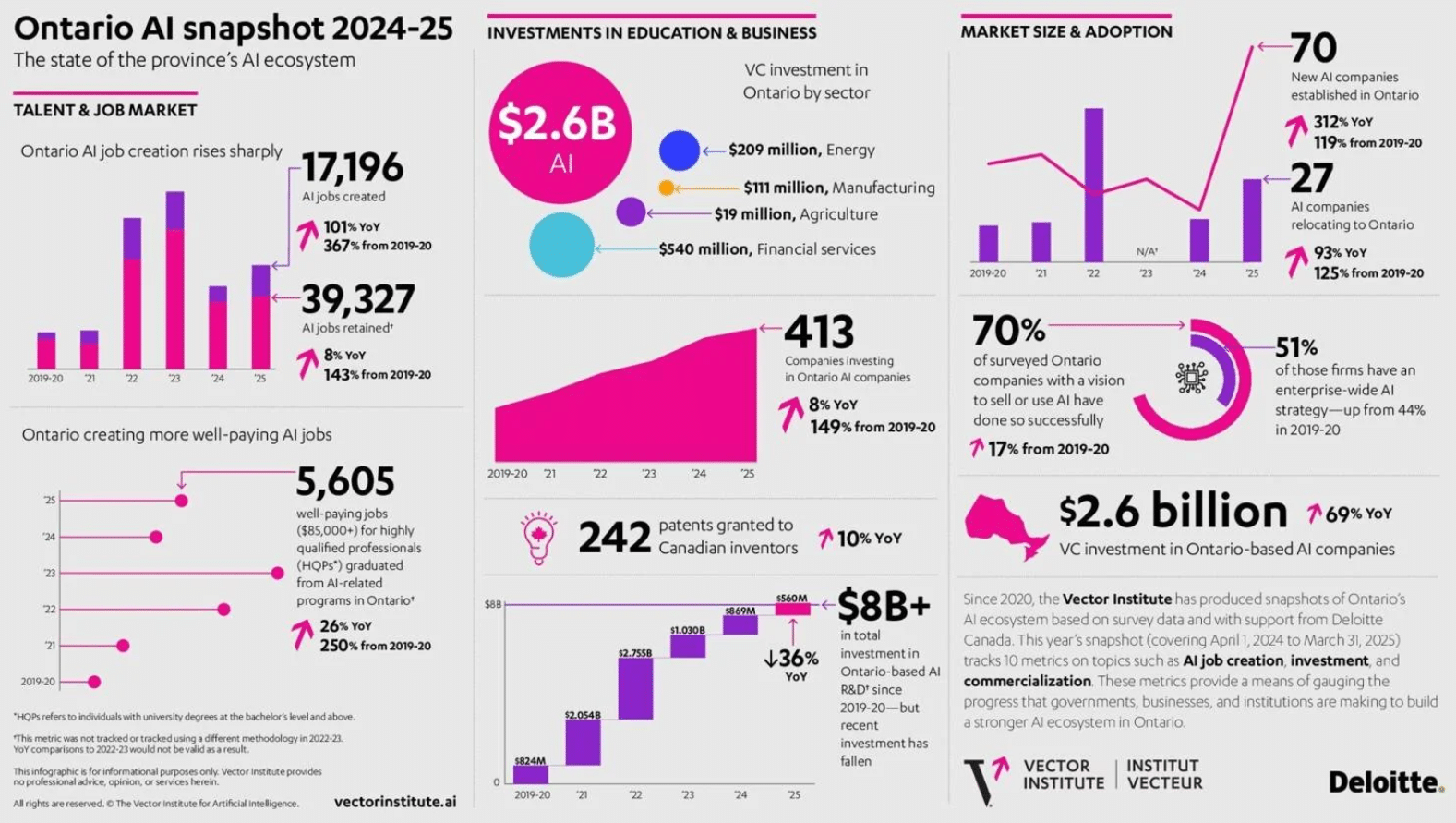Related Resources
For years, the most common criticism against AI has always been that it would eventually replace human workers. From manufacturing to creative writing, speculation has often centered on job displacement. Yet, a recent study by the Vector Institute, one of Canada’s leading AI research hubs, offers a compelling counterpoint: AI, when implemented responsibly in the private sector, is not eliminating jobs, but helping create them.
This finding is not just encouraging, it is a critical inflection point for business leaders, policymakers, and communities seeking to understand the true impact of AI, especially in the context of workforce management and development. At Bronson.AI, we’re proud to be at the forefront of this transformation, helping organizations harness AI to unlock new possibilities for their teams and communities.
New Data Signals a Turning Point in the AI-Employment Debate
According to the Vector Institute’s 2024 report, 29% of Ontario-based companies using AI reported an increase in hiring. Only 17% indicated a decrease in hiring due to AI adoption.

These figures suggest that AI is more likely to act as a growth enabler than a workforce reducer. But why is this shift occurring, and how exactly would AI adoption help boost employment in the private sector?
The short answer is that AI is increasingly being used to augment human capabilities, not replace them. With AI, organizations can now easily automate repetitive, time-consuming tasks, which allows employees to focus on higher-order work such as strategic planning, creative problem-solving, customer engagement, and data-driven decision-making.
In professional services, for example, AI tools are helping consultants and analysts process data faster, which not only improves client outcomes but also enables firms to take on more projects and expand their teams.
In domain areas such as auditing and finance, AI is used primarily to process data from an abundance of sources, but human inference is always used at the end of day to make strategic decisions based on the analysis provided by AI.
Similarly, in manufacturing, AI-driven predictive maintenance and process optimization are reducing downtime, increasing output, and ultimately fueling the need for more human oversight, not less.
Additional insights from the report underscore this positive trend:
- 67% of surveyed firms have either already adopted AI or plan to within the next one to two years.
- 59% are actively investing in upskilling or reskilling their employees.
- AI adoption is highest in professional services, manufacturing, and information and cultural industries, sectors traditionally associated with high employment capacity.
These trends and data are instrumental for debunking the most common fear surrounding AI adoption in the workplace, and gives further incentives for businesses to leverage AI to enhance their team’s efficiency. For job seekers, this means that improving their AI skill sets can actually increase their chances of being employed.
The Strategic Importance of Responsible AI Implementation
While this new data gives hope for future growth in employment, it is important to also remember that these positive outcomes do not happen independently or by accident. They are the result of intentional, well-scoped AI strategies that align with business goals, workforce capabilities, and ethical standards.
In order to use AI to augment your workforce instead of replacing them, companies need to have a clear framework for using and implementing AI, as well as policies around ethical use.
The Vector Institute’s data reinforces this: companies that invested in reskilling and workforce transformation were more likely to report growth in hiring, productivity, and innovation.
Furthermore, part of the reason why employment growth through AI was observed was because of new AI firms being established. According to the report, 70 new AI companies were also established and 27 AI firms relocated to Ontario, which lead to the creation of more than 17,000 new AI jobs in the province during this time period. As investments in AI increases, more job opportunities may open up for those with an interest in developing and implementing AI solutions.
Capitalizing on the “Core versus Peripheral” Skills Gap
As the private sector increases its ethical AI adoption in the workplace, the demand for labor with core AI skill such as deep learning and machine learning would likely increase even more in the future. In other words, companies would increasingly look towards hiring AI specialists who can develop custom models for forecasting, personalization, or process optimization.
Developing A Human-Centric Workforce, Supported by AI
The fear that AI will displace more workers than it empowers is not unfounded, but it is increasingly outdated. The latest research from the Vector Institute offers compelling evidence that with the right strategy, AI can be a powerful engine for job creation.
Ontario’s AI revolution is proof that technology, when harnessed responsibly, can be a powerful ally for workers and businesses alike. By investing in AI skills, fostering innovation, and partnering with trusted experts like Bronson.AI, organizations can create a future where people and technology thrive together.
At Bronson.AI, we specialize in helping organizations:
- Identify AI use cases that complement—not cannibalize—existing jobs
- Redesign roles and workflows to leverage augmented intelligence
- Build internal AI literacy and data fluency
- Integrate AI into strategic planning, not just IT pipelines
We also offer human-centric AI workshops for leadership teams, helping decision-makers understand the intersection between technology, people, and policy. This cross-functional education is vital for developing a culture that embraces innovation without compromising employee trust or well-being.




